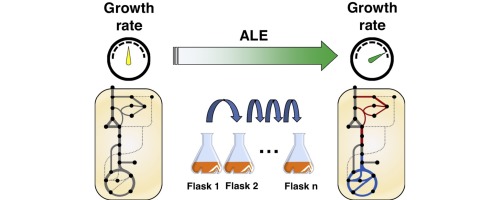Current Opinion in Chemical Engineering ( IF 8.0 ) Pub Date : 2018-11-26 , DOI: 10.1016/j.coche.2018.11.001 Christopher P Long , Maciek R Antoniewicz

|
Adaptive laboratory evolution (ALE) has emerged as a powerful tool in basic microbial research and strain development. In the context of metabolic science and engineering, it has been applied to study gene knockout responses, expand substrate ranges, improve tolerance to process conditions, and to improve productivity via designed growth coupling. In recent years, advancements in ALE methods and systems biology measurement technologies, particularly genome sequencing and 13C metabolic flux analysis (13C-MFA), have enabled detailed study of the mechanisms and dynamics of evolving metabolism. In this review, we discuss a range of studies that have applied flux analysis to adaptively evolved strains, as well as modeling frameworks developed to predict and interpret evolved fluxes. These efforts link mutations to fitness-enhanced phenotypes, identify bottlenecks and approaches to resolve them, and address systems concepts such as optimality.
中文翻译:

适应性进化如何重塑新陈代谢以提高适应性:最新进展和未来展望
自适应实验室进化(ALE)已成为基础微生物研究和菌株开发中的强大工具。在代谢科学和工程学的背景下,它已被用于研究基因敲除反应,扩大底物范围,提高对工艺条件的耐受性并通过设计的生长偶联提高生产率。近年来,ALE方法和系统生物学测量技术的进步,尤其是基因组测序和13 C代谢通量分析(13C-MFA),可以对新陈代谢的机理和动力学进行详细研究。在这篇综述中,我们讨论了将通量分析应用于自适应进化菌株的一系列研究,以及为预测和解释进化通量而开发的建模框架。这些工作将突变与适应性增强的表型联系起来,识别瓶颈和解决问题的方法,并解决系统概念(例如最佳性)。































 京公网安备 11010802027423号
京公网安备 11010802027423号